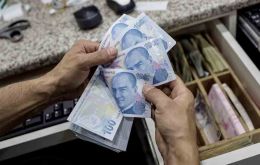MercoPress. South Atlantic News Agency
Tag: Argentina recession
-
Saturday, February 22nd 2020 - 10:08 UTC
Argentina economy shrinks two years running, 2.1% in 2019 after 2.5% in 2018

Recession-hit Argentina's economy shrank by 2.1% in 2019, the state statistics institute said on Friday. The institute said the economy contracted by 0.3% in December compared to the same period in 2018.
-
Thursday, May 16th 2019 - 09:52 UTC
April inflation in Argentina eases but reaches 3.4% and an annualized 55.8%

Argentina released April inflation numbers on Wednesday, with the monthly price rise easing to 3.4% - high by international standards, but below market expectations and reversing an acceleration trend that began in January.
-
Thursday, May 16th 2019 - 09:44 UTC
Argentina's unions decided a 24-hour national strike on 29 May

Argentina’s biggest labor union on Tuesday called for a 24-hour national strike to protest the government’s austerity policies, heaping pressure on President Mauricio Macri as he battles against a biting recession and jittery markets.
-
Wednesday, March 27th 2019 - 08:48 UTC
Argentine financial markets jittery over October elections uncertainty

Investors in Argentina are starting to get the jitters. The gap in yield between local and U.S.-issued bonds has roughly doubled in the last month in the face of stubborn inflation and mounting peso outflows, heaping pressure on President Mauricio Macri ahead of elections later in the year.
-
Tuesday, October 23rd 2018 - 08:53 UTC
Argentina's primary deficit falls to 1.1% of GDP, the lowest since 2012

Argentina's primary deficit fell to 1.1% of Gross Domestic Product (GDP) between January and September this year, compared to 2.1% over the same period in 2017, the Finance Ministry announced on Monday.
-
Friday, August 24th 2018 - 08:50 UTC
Argentina’s economy contracts in June for the third month running

Argentina’s economy contracted 6.7% in June compared with the same month last year, and 1.3% compared with May, government statistics agency Indec said on Thursday. June was the third consecutive month of decline following 5.2% in May and 0.6% in April.
-
Wednesday, July 25th 2018 - 05:36 UTC
Argentina's stats office data reveals recession is round the corner

Argentina's economy shrank 5.8% in May versus the same month last year, government statistics agency Indec said on Tuesday, the second straight month of declines in a sign of looming recession and a possible GDP contraction in 2018.
-
Wednesday, July 2nd 2014 - 00:13 UTC
Data confirms Argentina's economy has slid into recession

Argentina’s economic activity index (EMAE), which is seen as a close proxy of GDP, fell 0.5% in April compared with the same month last year, according to data released by the government's stats office Indec. Nonetheless activity went up 0.6% in April compared to March.
